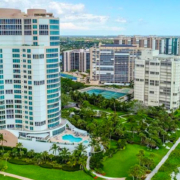Condo boards must now get vote before material alterations begin
A very important change to Chapter 718 of the Florida Statutes (The Condominium Act) took effect July 1, 2018 that all Condominium Associations need to be aware of.
In House Bill 841, the last sentence in Section 718.113(2)(a), Florida Statutes was amended by adding the highlighted language: “Except as otherwise provided in this section, there shall be no material alteration or substantial additions to the common elements or to the real property which is association property, except in a manner provided in the declaration as originally recorded or as amended under the procedures provided therein. If the declaration as originally recorded or as amended under the procedures provided therein does not specify the procedure for approval of material alterations or substantial additions, 75 percent of the total voting interests of the association must approve the alterations or additions before the material alterations or substantial additions are commenced.”
Material alterations or substantial additions are basically any addition or improvement to real estate. This would include changing the paint color of the buildings (even minor changes in color), changing the type or color of tile or carpeting in the common areas or major landscaping changes.
There are some exceptions that have been carved out by Division arbitrators and courts not requiring a vote for certain alterations including adding a sea wall to protect the property, replacing river rock on balconies with tile and replacing asphalt with pavers. These exceptions are based upon protection of the condominium property and engineering recommendations.
Many condominium declarations, that have been rewritten and updated, will provide that the board of directors may make many material alterations under a certain dollar figure (usually somewhere between $30,000 and $50,000) and only require a membership vote if the alterations or additions will cost more than the dollar limit. This will allow many things to happen such as minor updates to the social room without having to get a membership vote.
However, most older or original declarations will be silent on this issue and therefore a 75 percent membership vote will be required for any and all alterations to the common areas (even ones that may only cost a few hundred dollars).
Before this new law change, that went into effect last month that mandated that the material alteration vote must be taken BEFORE the material alteration or substantial addition commenced, many boards would go ahead and approve the material alteration or substantial addition without a membership vote and take the risk that if an owner challenged them, they could always go get the membership vote after the alteration or addition was completed.
Now, it does not appear you can correct “not taking the vote” after the alteration or addition commenced. So, if your board does the alteration now before a vote, the association may very well have to pay for the cost of undoing the material alteration or substantial addition. All you will need is one dissident owner challenging the board for not taking the vote first. It won’t matter even if a vast majority of the owners like the alteration or addition and would approve a vote for it if a vote was attempted after the fact. Because the vote was not taken before the alteration or addition, the change will probably have to be undone if the dissident brings legal action against the association.
In addition, the directors, who allowed the alteration or addition without a vote, may be looking to the Association’s Directors and Officers liability insurance for any coverage after the fact to defend them if challenged.
So the lesson to be learned is that condominium associations with old documents need to update them to allow the board of directors to determine most alterations or additions that aren’t very expensive and go for the membership vote for the expensive alterations or additions.
Until old documents are updated, be sure to go get a membership vote first on all alterations or additions, even the inexpensive ones, or you may be paying twice to undo the changes that were not approved by the members first.



